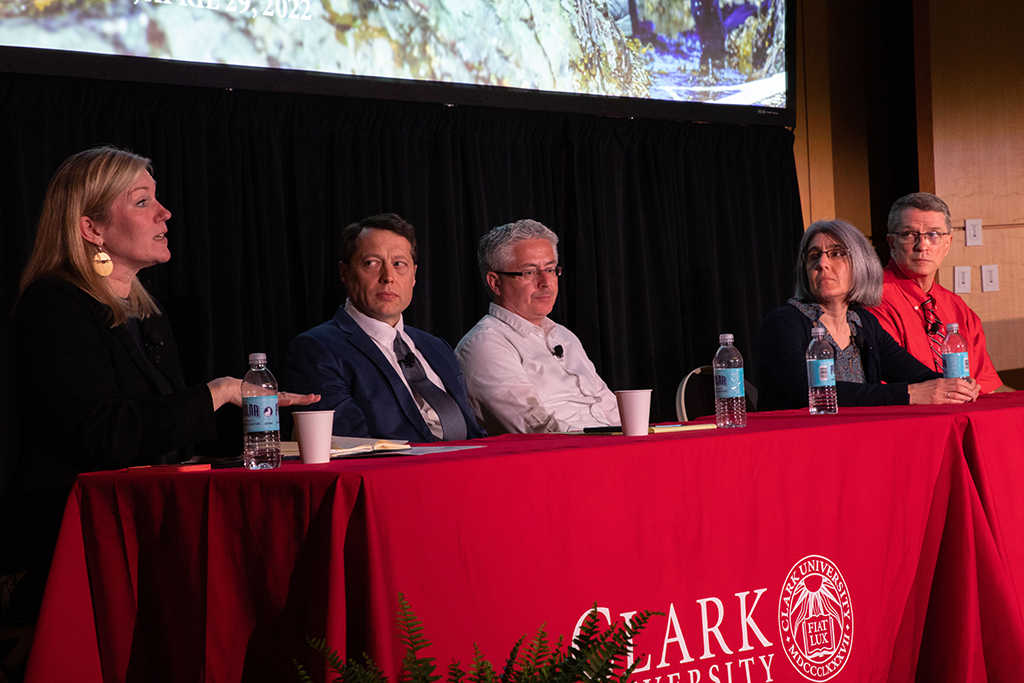INAUGURATION ACADEMIC SYMPOSIUM – APRIL 29, 2022
‘The truth is what we see on the ground’

Geography Professor Gil Pontius opened the session “Geography of Changing Lands and Seas” with a brain teaser that illustrated how metrics can be applied — in different ways and toward different ends — to try and reach an agreed-upon truth. It’s an ambitious pursuit, he noted, particularly when one is researching land change through the use of both remote-sensing technology and in-person observation. “The truth is what we see on the ground,” he said.
His was a fitting introduction to the April 29 event, at which his fellow panelists from the Graduate School of Geography shared their stories of striving to make an impact in a world being altered by climate change, development, and other factors. The discussion was part of the Academic Symposium, one of the events held to celebrate the Inauguration of President David B. Fithian.
Professors John Rogan and Deborah Martin, who direct the Human-Environment Regional Observatory (HERO) program, noted that in its 23-year history the program has created opportunities for 180 students to conduct hands-on research in Worcester and surrounding towns. Clark students have been critical contributors to the Greening the Gateway Cities initiative and in the local and federal response to the Asian long-horned beetle infestation that devastated thousands of trees in Worcester’s Burncoat and Greendale neighborhoods.
Martin noted that students have enjoyed opportunities to interact with policymakers and stakeholders, and have published their research in various publications both as co-authors and lead authors. Most recently, HERO students collaborated with the Worcester community to restore Hadwen Arboretum, the Clark-owned 6.4-acre woodland property used for hiking and ecological research.
Professor Lyndon Estes described the work he and Clark graduate students, along with other colleagues, have done in Africa, where food demand is expected to triple by 2050. He specified projects undertaken in Ghana, Zambia, and Tanzania, that have the goal of helping local farmers improve their crop yields with the help of remote imaging analysis. Tactics like drone images, in-person field visits, and better mapping of crops are helping determine where efforts can be applied to better tailor farm-management techniques.
In Zambia, Estes said, a study funded by the National Science Foundation and NASA is tracking long-term agricultural expansion and the cultural change it has brought. Another NASA-funded study, in Tanzania, employs satellites to track the migratory habits of elephants, which helps inform decisions about where agricultural and conservation land is placed. Estes told the audience that he hoped these examples give them an idea of the “real revolution” taking place in geospatial analytical capabilities.
The session moved from the lands of Africa to the seas of Antarctica as Professor Karen Frey offered a look at her work researching the effects of melting sea ice on marine ecosystems, the biochemistry of permafrost environments, and glacier, icesheet, and snow-melt dynamics in Antarctica, Siberia, Greenland, and Alaska. She noted the robust cohort of students over the years who have sailed with her on icebreakers to conduct research, with two students accompanying her this summer to the Bering and Chukchi seas.
Frey noted that temperatures in arctic areas are warming four times faster than average global temperatures, as bright reflective surfaces like snow and ice continue to melt and are replaced by dark sea water. She said that each year over the last 42 years the arctic loses sea ice mass that’s equivalent in size to the state of South Carolina, and showed slides depicting “melt ponds” that are allowing light to be transmitted through sea-ice surface, allowing for photosynthesis to take place beneath the sea. The process is resulting in “dire consequences” for arctic ecosystems, she said.
When an audience member asked how Clark’s geographers respond to climate-change skepticism, Pontius noted that doing so can be challenging, even within the scientific community. He said his most highly cited paper strongly discredits a metric that is “inappropriate and makes no sense” yet is still embraced by many other scientists. “That’s my baseline for how difficult it is to change people’s attitudes and habits.”
Read about the other sessions held for the Academic Symposium, one of the events celebrating the Inauguration of President David B. Fithian:
- Climate change work must extend beyond research
- Professors explore counternarratives of design and innovation
- Faculty put advanced digital technology to use in the classroom and lab
- Symposium session addresses Clark’s impact in the community
- The fraying of democracy is a global problem, professors say
- Faculty researched, and learned from, the pandemic
- Life, and death, considered through the lens
- Academic Symposium inspires discussion on consequential concerns


